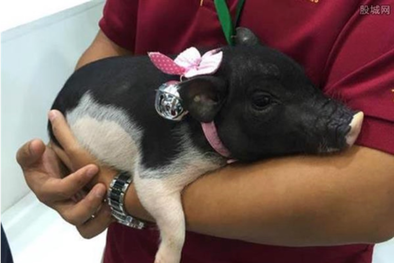 A Chinese research company is planning to sell its 'micro pig' as a pet after it successfully edited the DNA of the animal to stunt its growth. Beijing Genomics Institute (BGI) created the pig, which grows to weigh between 14 and 20 kilograms, by changing the DNA responsible for its growth. The company originally genetically modified the Bama pig breed for research but announced at a Bio Tech Leader summit in China recently their plans to sell it. But the reasons as to why researchers are excited about the micro pigs are quite different to people wanting a petite pet porker. Researcher Dr Hannah Brown from the University of Adelaide said gene editing techniques were fascinating. "It's almost like GPS-guided molecular scissors," she said. "What they do is they put those scissors into a cell and those scissors attract specifically to a place in the DNA. "They can make a cut and cut out a piece of DNA and exchange it for a different piece. "In this case this is actually what they did in pigs. "They took some pigs cells and they put in these molecular pair of scissors and they trimmed out a piece of the DNA that determines how big the pig grows," Dr Brown said. Dr Brown said it's understood the pigs were firstly created for medical research. "They were attempting to generate a smaller and faster-breeding pig so they could use them for genetic testing for the development of disease models. "The thing about pigs is that generally they are quite large and expensive to look after, so reducing the size of the animals means that it's less expensive to work with and easier to look after." What genetic editing could mean for human health In terms of research, Dr Brown said the pigs were of high interest. "Evidence like this, a generation of what looks like happy live pigs, is really exciting. "It means we are advancing what we know about these genetic-editing technologies and advancing towards a place where maybe we will be able to use them to cure diseases in humans." Dr Brown said successfully editing the pigs' growth wasn't far removed from curing a human disease. "Research-wise they aren't that far apart," she said. "Curing a genetic disease would require us to identify the message in the DNA that's faulty and replace it and that's basically what they did in these pigs. "They took the pig DNA and cut out the part of the message that we know regulates pig growth. "We now know that many of the genes or many of the parts of the DNA that regulate diseases like Huntington's and Cystic Fibrosis. "Potentially this offers us hope in terms of hoping to trim out those disease-causing bits of DNA in humans," Dr Brown said. Dr Brown said research coming out of China was already looking at modifying human DNA, in a contentious way. "Three or four months ago there was some similar technology that looked like it had been pushed out of China in terms of genetically modified human embryos. "This was really concerning because we hadn't seen a lot of this same technology being used in large animals, we had seen it be used with cells in the dish, we had seen it being used in rodents — but not in larger animals." Dr Brown said cloning work was occurring in Australia but not in this form. "In terms of generating cloned pigs and miniature pigs, that kind of research isn't going on, I'm not aware of it," she said. "In pigs we do clone for other reasons so there's research looking into pigs as models for diabetes, as the pig is very similar to the human in many mechanisms." A company spokesman said the animals were expected to live to 15 to 20 years old. However Dr Brown did say the micro pigs had only been through one reproductive cycle, so its life expectancy was yet to be proven. "We don't really know what their outcome is long term; we don't know if they'll live a happy full life based on the fact that we have modified their DNA," she said. "They may be completely normal, but the jury is still out on whether that's the case or not." Source: ABC Rural / Tyne McConnon A Peaceful Farewell provides compassionate at home pet euthanasia to fellow pet owners in Chandler, Gilbert, Mesa, Tempe, Ahwatukee, Scottsdale, and most of the Greater Phoenix Metropolitan Area.
0 Comments
Leave a Reply. |
The PAW Blog...
For the LOVE of Pets The goal of this blog is to help educate pet owners by sharing pet health facts and pet news articles...and ... sometimes put a smile on your face with a cute or funny pet story! Categories
All
Archives
July 2024
Search for any topic...
|

 RSS Feed
RSS Feed

